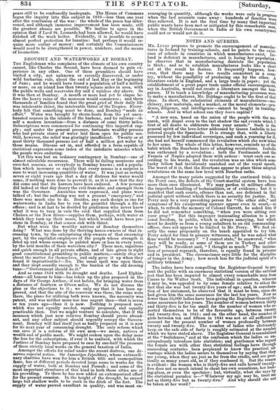NOTES AND QUERIES.
Mn. LUCAS proposes to promote the encouragement of manilla°. tures in Ireland by training-schools, and he points to the exist_ ence of schools in countries in which manufactures exist. ]re. land is deficient in manufactures, and is losing her population: he observes that in manufacturing districts the population is thick; and so to establish manufactures looks like a short cut at the result he desires. It frequently happens, how. ever, that there may be two results coexistent in a coml. try, without the possibility of producing one by the other. A literature exists in England, and a large trade in paper; yet the establishment of a great paper trade under official encouragement, say in Australia would not create a literature amongst the kan. garoos. If to teach a knowledge of manufacturing processes were to make a manufacturer, Mr. Babbage ought to be the first of that class. In short, the substantial elements of manufactures—ma- chinery, raw materials, and a market, or the moral elements—pm. deuce, diligence, and intelligence—cannot be taught in training.. schools. And in what school can they learn capital?
"A new tem, based on the union of the people with the mo- narch, will dispel even to the last shadow the sad events which I first of all desire to obliterate from your annals." Such is the general spirit of the love-letter addressed by Queen Isabella to her beloved people the Spaniards. It is strange that, with a liberty possessed by few individual sovereigns, and such a yearning for it, she had not herself commenced the revolution which she now takes to her arms. The whole of this letter, however, reminds us of the habit which the Bourbons have of adopting revolutions. Isabella was enthroned by a revolution ; both the Ferdinands and the Francis of Naples adopted them with ardour : trust each one ac- cording to his words, and the revolution was an idea which some lucky fellow had invidiously snatched out of the royal mouth. The worst of it is, that the Bourbons appear to place these adopted revolutions on the same low level with Bourbon oaths.
Amongst the many points suggested by the continued trials in the Perry case, the defects of the Court-martial system have been more than once illustrated. We may pardon to military officers the imperfect handling of technicalities, or of evidence; but it is manifest that such courts, oftener than not, are deficient in that judicial spirit without which there is no security for justice. Mr. Perry may be a very provoking person for "the other side," and symptoms of his exasperating manner appear even in court,—as when, to refresh the memory of Colonel Garrett, he asked him if he did not remember something, "when yon were sitting over your grog?" But this improper insinuating allusion to a per- sonal freedom in public, which is always annoying, but which must be doubly so from a young subaltern to an old commanding- officer, does not appear to le limited to Mr. Perry. We find ex- actly the same propensity on the bench appointed to try him. Perry asked for time to procure witnesses, and he was asked what time would be necessary ? "I cannot state," he answered, "when they will be ready, as some of them are in Turkey and other parts." The President said, "I thought as much." The insinua- tion of personal reproach, therefore, is equally found in prisoner and in president. The circumstance says little for the discipline of temper in the Army ; how much less for the judicial spirit of a military tribunal ?
The ladies have been compelling the Registrar-General to pre- sent the public with an enormous statistical version of the satirical jest that has been imputed to almost every remarkable man from Cicero to Sir Walter Scott. The individual in question, whoever it may be, was appealed to by some female relative to attest the fact that she was but twenty-five years of age ; and, in corrobora- tion of her statement, he observed that it must be true, since she had given him the same assurance for the last ten years. Now no fewer than 35,000 ladies have been giving the Registrar-General the same assurance for ten years. The number of women between thirty and thirty-five is far too small for the number of women who re- ported themselves to be of the favourite age, between twenty and twenty-five, in 1841; and on the other hand, the number of girls between ten and fifteen in 1841 was not at all sufficient to account for the present number of women professedly betvreen twenty and twenty-five. The number of ladies who obstinately keep on the safe side of forty is roughly estimated at the number which we have stated above. The Registrar-General is scandalized at the "foolishness," and at the confusion which the ladies so un- scrupulously introduce into statistics; and gentlemen who regard the female sex with other than statistical feelings have through succeeding centuries been perplexed to know the practical ad- vantage which the ladies secure to themselves by saying that they are young, when they are just as far from the cradle, and are prac- tically as many years old, as if they confessed it. But the reason is evident : the woman who is thirty-five and calls herself twenty- five does not so much intend to cheat her own sensations, her look- ing-glass, or even the spectator ; but, virtually, what she says by the statistical paradox is—" Whatever my age may be, treat ma not as thirty-five but as twenty-five." And why should she not be taken at her word ?


























 Previous page
Previous page